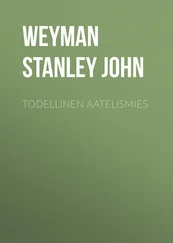Stanley Weyman - The Great House
Здесь есть возможность читать онлайн «Stanley Weyman - The Great House» — ознакомительный отрывок электронной книги совершенно бесплатно, а после прочтения отрывка купить полную версию. В некоторых случаях можно слушать аудио, скачать через торрент в формате fb2 и присутствует краткое содержание. Жанр: foreign_language, foreign_prose, на английском языке. Описание произведения, (предисловие) а так же отзывы посетителей доступны на портале библиотеки ЛибКат.
- Название:The Great House
- Автор:
- Жанр:
- Год:неизвестен
- ISBN:нет данных
- Рейтинг книги:4 / 5. Голосов: 1
-
Избранное:Добавить в избранное
- Отзывы:
-
Ваша оценка:
- 80
- 1
- 2
- 3
- 4
- 5
The Great House: краткое содержание, описание и аннотация
Предлагаем к чтению аннотацию, описание, краткое содержание или предисловие (зависит от того, что написал сам автор книги «The Great House»). Если вы не нашли необходимую информацию о книге — напишите в комментариях, мы постараемся отыскать её.
The Great House — читать онлайн ознакомительный отрывок
Ниже представлен текст книги, разбитый по страницам. Система сохранения места последней прочитанной страницы, позволяет с удобством читать онлайн бесплатно книгу «The Great House», без необходимости каждый раз заново искать на чём Вы остановились. Поставьте закладку, и сможете в любой момент перейти на страницу, на которой закончили чтение.
Интервал:
Закладка:
"What is it?"
"There's a strong feeling," the lawyer answered, his face serious, "that the party is not being led aright. And that Mr. Mottisfont, who is old-"
"Is willing to go with the party, eh, Stubbs?"
"No, my lord, with the party leaders. Which is a different thing. Sir Robert Peel-the land put him in, but, d-n me, my lord" – the lawyer's manner lost much of its deference and he spoke bluntly and strongly-"it looks as if he were going to put the land out! An income-tax in peace time, we've taken that. And less protection for the farmer, very good-if it must be. But all this taking off of duties, this letting in of Canadian corn-I tell you, my lord, there's an ugly feeling abroad! There are a good many in Riddsley say that he is going to repeal the Corn Laws altogether; that he's sold us to the League, and won't be long before he delivers us!"
The big man sitting back in his chair smiled. "It seems to me," he said, "that you are travelling rather fast and rather far, Stubbs!"
"That's just what we fear Sir Robert is doing!" the lawyer retorted smartly, the other's rank forgotten. "And you may take it from me the borough won't stand it, my lord, and the sooner Mr. Mottisfont has a hint the better. If he follows Peel too far, the bottom will fall out of his seat. There's no Corn Law leaguer will ever sit for Riddsley!"
"With your help, anyway, Stubbs," my lord said with a smile. The lawyer's excitement amused him.
"No, my lord! Never with my help! I believe that on the landed interest rests the stability of the country! It was the landed interest that supported Pitt and beat Bony, and brought us through the long war. It was the landed interest that kept us from revolution in the dark days after the war. And now because the men that turn cotton and iron and clay into money by the help of the devil's breath-because they want to pay lower wages-"
"The ark of the covenant is to be overthrown, eh?" the young man laughed. "Why, to listen to you, Stubbs, one would think that you were the largest landowner in the county!"
"No, my lord," the lawyer answered. "But it's the landowners have made me what I am. And it's the landowners and the farmers that Riddsley lives by and is going to stand by! And the sooner Mr. Mottisfont knows that the better. He was elected as a Tory, and a Tory he must stop, whether Sir Robert turns his coat or not!"
"You want me to speak to Mottisfont?"
"We do, my lord. Just a word. I was at the Ordinary last fair day, and there was nothing else talked of. Free Canadian corn was too like free French corn and free Belgian corn for Stafford wits to see much difference. And Peel is too like repeal, my lord. We are beginning to see that."
Audley shrugged his shoulders. "The party is satisfied," he said. "And Mottisfont? I can't drive the man."
"No, but a word from you-"
"Well, I'll think about it. But I fancy you're overrunning the scent."
"Then the line is not straight!" the lawyer retorted shrewdly. "However, if I have been too warm, I beg pardon, my lord."
"I'll bear it in mind," Audley answered. "Very good. And now, good-night, Stubbs. Don't forget to send the letter to John Audley as soon as you reach London."
Stubbs replied that he would, and took his leave. He had said his say on the borough question, lord or no lord; which to a Briton-and he was a typical Briton-was a satisfaction.
But half an hour later, when he had drawn his nightcap down to his ears and stood, the extinguisher in his hand, he paused. "He's a sober hand for a young man," he thought, "a very sober hand. I warrant he will never run his ship on the rocks for lack of a good look-out!"
CHAPTER IV
HOMEWARD BOUND
In the corner of the light diligence, seating six inside, which had brought her from Montreuil, Mary Audley leant forward, looking out through the dingy panes for the windmills of Calais. Joséphine slept in the corner facing her, as she had slept for two hours past. Their companions, a French shopkeeper and her child, and an English bagman, sighed and fidgeted, as travellers had cause to sigh and fidget in days when he was lucky who covered the distance from Paris to Calais in twenty-five hours. The coach rumbled on. The sun had set, a small rain was falling. The fading light tinged the plain of the Pas de Calais with a melancholy which little by little dyed the girl's thoughts.
She was on her way to her own country, to those on whom she might be dependent without shame. And common sense, of which she had a large share, told her that she had cause, great cause to be thankful. But the flush of relief, to which the opening prospect had given rise, was ebbing. The life before her was new, those amongst whom she must lead that life were strange; nor did the cold phrases of her uncle's invitation, which ignored both her father and the letters that she had written, promise an over-warm welcome.
Still, "Courage!" Mary murmured to herself, "Courage!" And she recalled a saying which she had learned from the maid, "At the worst, ten fingers!" Then, seeing that at last they were entering the streets of the town and that the weary journey was over-she had left Paris the day before-she touched Joséphine. "We are there," she said.
The maid awoke with her eyes on the bagman, who was stout. "Ah!" she muttered. "In England they are like that! No wonder that they travel seeing that their bones are so padded! But, for me I am one ache."
They jolted over the uneven pavement, crossed a bridge, lumbered through streets scarcely wider than the swaying diligence, at last with a great cracking of whips they swerved to the left and drew up amid the babel of the quay. In a twinkling they were part of it. Porters dragged down, fought for, snatched up their baggage. English-speaking touts shook dirty cards in their faces. Tide-waiters bawled questions in their ears. The postilion, the conductor, all the world stretched greedy palms under their noses. Other travellers ran into them, and they ran into other travellers. All this, in the dusk, in the rain, while the bell on the deck overhead clanged above the roar of the escaping steam, and a man shouted without ceasing, "Tower steamer! Tower steamer! Any more for England?"
Joséphine, after one bitter exchange of words with a lad who had seized her handbag, thrust her fingers into her ears and resigned herself. Even Mary for a moment was aghast. She was dragged this way and that, she lost one article and recovered it, lost another and recovered that, she lost her ticket and rescued it from a man's hand. At last, her baggage on board, she found herself breathless at the foot of the ladder, with three passengers imploring her to ascend, and six touts clinging to her skirts and crying for drink-money. She had barely time to make her little gift to the kind-hearted maid-who was returning to Paris by the night coach-and no time to thank her, before they were parted. Mary was pushed up the ladder. In a moment she was looking down from the deck on the wet, squalid quay, the pale up-turned faces, the bustling crowd.
She picked out the one face which she knew, and which it pained her to lose. By gestures and smiles, with a tear in the eye, she tried to make amends to Joséphine for the hasty parting, the half-spoken words. The maid on her side was in tears, and after the French fashion was proud of them. So the last minute came. The paddles were already turning, the ship was going slowly astern, when a man pushed his way through the crowd. He clutched the ladder as it was unhooked, and at some risk and much loss of dignity he was bundled on board. There was a lamp amidships, and, as he regained his balance, Mary, smiling in spite of herself, saw that he was an Englishman, a man about thirty, and plainly dressed. Then in her anxiety to see the last of Joséphine she crossed the deck as the ship went about, and she lost sight of him.
Читать дальшеИнтервал:
Закладка:
Похожие книги на «The Great House»
Представляем Вашему вниманию похожие книги на «The Great House» списком для выбора. Мы отобрали схожую по названию и смыслу литературу в надежде предоставить читателям больше вариантов отыскать новые, интересные, ещё непрочитанные произведения.
Обсуждение, отзывы о книге «The Great House» и просто собственные мнения читателей. Оставьте ваши комментарии, напишите, что Вы думаете о произведении, его смысле или главных героях. Укажите что конкретно понравилось, а что нет, и почему Вы так считаете.












